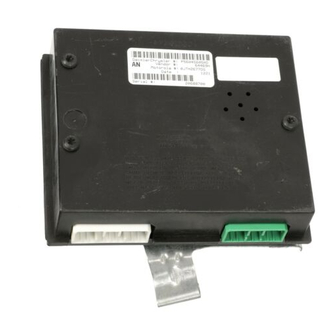
Advertisement
for EVS II Security and Keyless Entry Systems
Note: It is recommended that this installation take place prior to rustproofing.
The individual delivering the vehicle should review the
operation of this security system and any optional features
with the owner of the vehicle. Please place the operating
instructions in the glove compartment with the vehicle
Owner's Manual.
Please review these instructions completely before beginning
the installation of this vehicle security system.
Technical Support is available to authorized MOPAR dealers by
calling 1-800-34-MOPAR (1-800-346-6727). Please have your
dealer code number and VIN available when calling. Technical
Support hours are 8:00 AM (EST) - 7:00 PM Monday - Friday and
10:00 AM - 2:00 PM Saturday. 24 hour automated assistance is
INS0854
available for answers to frequently asked questions by calling the
Rev. A
FAXBACK information system at (810) 589-5297.
8/98
Installation Instructions
TECHNICAL SUPPORT
Advertisement
Table of Contents

Summary of Contents for Mopar EVS II
- Page 1 Installation Instructions for EVS II Security and Keyless Entry Systems Note: It is recommended that this installation take place prior to rustproofing. The individual delivering the vehicle should review the operation of this security system and any optional features with the owner of the vehicle. Please place the operating instructions in the glove compartment with the vehicle Owner's Manual.
-
Page 2: Air Bag Warning
AIR BAG WARNING! THE AIR BAG SYSTEM IS A SENSITIVE AND COMPLEX ELECTRO-MECHANICAL UNIT. BEFORE BEGINNING THIS INSTALLATION YOU MUST FIRST DISCONNECT AND ISOLATE THE NEGATIVE BATTERY CABLE (GROUND). AFTER DISCONNECTING THE NEGATIVE BATTERY CABLE, WAIT AT LEAST ONE MINUTE BEFORE CONTINUING TO WORK ON THE VEHICLE. -
Page 3: Installation Flowchart
Installation Flowchart 1. Installer Preparation Page 4 Security and Keyless Systems 2. Vehicle Optional Preparation Page 5 Keyless Entry Only ○ ○ ○ ○ ○ ○ ○ ○ ○ ○ Starter 3. Main Harness Main Switched Interrupt Connection Power Power (Security Page 6 Only) - Page 4 1. Installer Preparation A. Required Tools: Wire cutter/strippers Terminal extracting tool Assorted Screwdrivers Needle nose pliers Assorted Nut drivers Acid free solder (rosin core) Voltmeter T-15, T-20 & T-30 Torx screwdrivers Soldering iron B. Connection Procedures Remove and Replace Procedure Locate the appropriate Separate the connector Remove the locking...
-
Page 5: Vehicle Preparation
2. Vehicle Preparation A. Pre Installation 1. Lower the driver’s door window to avoid locking the keys in the vehicle during installation. Disconnect and isolate the negative battery terminal. Remove fuse from the EVS wiring harness. Review the System Layout at the back if this manual. B. - Page 6 3. Main Harness Connection Replace O.E. Ignition Switch Harness with EVS Power Harness Unplug the 7-way ignition switch connector from the back of the ignition switch (diagram 3.1). Carefully slice back harness tape so that 7-way ignition connector can be freely pulled about half way down the steering column.
- Page 7 4. Secondary Harness Connection(s) A. Courtesy Light Connection Locate the C203 26-way body connector (Diagram 4.1) attached to the bottom of the 74-way instrument panel connector (left side of steering column). Center splice the EVS YELLOW wire to the O.E. M2 YL wire in cavity #8 of the 26- way body connector.
-
Page 8: Alarm Connections
5. Alarm Connections A. Siren (Optional w/ Keyless Entry) Locate the mounting location, just behind the battery on the drivers side fender well (see picture 5.1). Mount the siren using the supplied 1/4' sheet metal screws. Route the siren wires to the area where the hood release cable goes through the bulkhead panel. - Page 9 5. Alarm Connections B. Multi-Function Status Indicator / Pushbutton 1. Keyless Entry Systems: Find a mounting location under the dash that is not easily seen, yet is accessible by the customer. Security Systems: Find a mounting location for the status indicator that is visible from outside the vehicle.
- Page 10 5. Alarm Connections C. Emergency Override / Programming Button (Security Only) 1. Find a hidden (not plainly visible) location underdash that is accessible while sitting in the drivers seat. It is suggested that the override button be mounted in a different location for each installation.
- Page 11 6. System Power-Up, Test, and Adjustment A. System Power-Up 1. Re-check all connections and connectors to make sure they are properly insulated and seated with their appropriate mating connector. 2. Re-connect the vehicles negative battery terminal. 3. Replace any vehicle fuses removed during the installation. 4.
- Page 12 6. System Power-Up, Test, and Adjustment B. System Test (cont.) Operation Troubleshooting Procedure AFTER THE SYSTEM HAS BEEN DISARMED (UNLOCKED), CHECK THE FOLLOWING: Engine will start Check connections Doors lock when ignition key is turned on and all doors are closed Check Operating Characteristics Option Transmitter range (attempt operating system from 25-50 feet)
- Page 13 6. System Power-Up, Test, and Adjustment C. Programming Additional Transmitters Up to four transmitters can be programmed to the security or keyless entry system. Security Systems: 1. Open the driver’s door. 2. Turn the vehicle ignition to the ON position. 3.
- Page 14 6. System Power-Up, Test, and Adjustment Security Systems BUTTON 2 Status Indicator Displays BUTTON 1 Press to Press to Turn Option Status (On or Off) Advance to Next Option On or Option Siren Chirps Denote Option # PRESS BOTH BUTTONS To exit Options Programming to Reset All Options Mode , turn ignition off.
- Page 15 To YL Cavity #8 26-Way Body Connector To Chassis Ground Vehicle Door Harness 16-Way Door Jamb Connector...
-
Page 16: System Layout
System Layout...


Need help?
Do you have a question about the EVS II and is the answer not in the manual?
Questions and answers